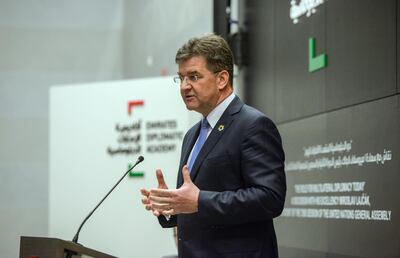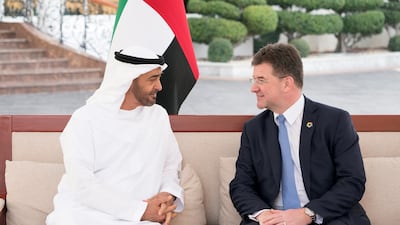For the first time since the Second World War we are at a grave risk of leaving the planet in worse shape than how we received it from our predecessors, the President of the United Nations General Assembly said on Sunday.
Miroslav Lajcak, who is visiting the UAE for Abu Dhabi Sustainability Week, said global warming was a reality that affected living conditions around the world.
"We can't guarantee that the living conditions for our children will be better than they were for us and this is a grave risk," he said before giving a lecture at the Emirates Diplomatic Academy.
"There are countries that are disappearing from the surface of the planet, there are people who were forced to leave their homes because they are no longer liveable so I believe this is no longer denied and we need to advance this."
He said despite the world coming together in a pledge to fight climate change, hard action is still needed as well as financial resources, which are falling short.
"We agreed in Paris to limit the global warming below 2°C and eventually if possible below 1.5°C but we are not delivering," Mr Lajcak said. "We're short of 100 billion dollars a year to do so, so we need to talk about that. The good thing is we are able to agree on policies but this agreement should be followed by concrete action, and the action is missing in many cases so we need to have events like ADSW and speak about positive examples, speak openly about the problems and link our ambitions and plans with financial resources."
The challenges facing the world today, including climate change, global warming, terrorism and migration, are global in nature and therefore require an international effort, he said.
_______________
Read more:
New skills drive to prepare UAE's officials for a changing and complex world
UAE contributes to the Office of the President of the United Nations General Assembly
_______________
"No country can solve them alone or deal with [them] at a national level," he said. "I regret the withdrawal of the United States from a number of processes, including the Global Compact for Migration, but the good thing is it strengthened the resolve of the rest of the international community to deliver. I hope this withdrawal is temporary and I am looking forward to the return of the US to these processes."
He spoke of the UAE as a leading example for countries in a number of areas, including sustainable development, sustainable energy and diversification of its economy.
“The UAE is also a leader when it comes to providing developmental assistance so it can influence the situation in the region and countries in the region in a most positive way. I would like to encourage [it] to lead by example and to engage in this direction because there is no better argument than concrete leading [by] example.”

He said countries in the region are facing different challenges but hoped to see a more collaborative effort between the Middle East and UN.
"I wish to see the region as a whole contributing to the work of the UN and be part of the solution of the issues we are dealing with," he said. "The number one problem is the situation in Yemen and the huge humanitarian suffering that comes as a consequence of the conflict and I hope we will find a political solution and one that will help to end the suffering of people."
Mr Lajcak also plans on visiting Kuwait and Qatar while in the region. On the Gulf crisis, he said the regional atmosphere was not very favourable. "I hope [my trip] will help give me a much better insight and to hear from the actors on the ground how they see the solution of the current situation," he said. "It's not about [whether] it will be resolved or not, it's when, because there is no alternative. This is what diplomacy is for – this region has a great ability to deal with internal or regional issues and I am confident this will be the case this time as well."
Bernardino Leon, director general of the academy, said Mr Lajcak had extensive experience in challenging regions, such as the Balkans. "The General Assembly is the most important organ of the UN and the UN is the most important international organisation in the world," he said. "Personally, I think negotiation is the most important and difficult activity. But he has rich experience for us to understand."

